#the early 20th century was not a good time to be a woman
Text
How the Nazis destroyed the queer and trans culture of Berlin

Given the current anti-trans hysteria found among TERFs and the far right, it is important to remember the history of the LGBTQ community. Berlin had once a thriving queer culture, with a research institute that studied and helped queer and transgender people.
Michael Lombardi-Nash has taken the time to translate all the central works of the German LGBTQ movement before the Nazi takeover, including the researcher and activis Magnus Hirschfeld's research on gay and trans people.
Why is this important? Because that anti-trans movement is trying to get people to believe that being transgender is a new thing. It is not, and the texts and stories from Germany in the early 20th century prove it.
Magnus Hirschfeld was a gay activist, feminist, scientist and founder of the Institute for Sexual Research in Berlin (1919-1933). His support for both gay and trans people was radical and innovative.
The institute was essential in the LGBTQ struggle of the time, and his thinking continue to influence our understanding of queer and trans lives.
Magnus is the one with the glasses in the photo above.
In 1933 the Nazis took over Germany, and they started attacking the LGBTQ community straight away. They sacked Hirschfeld's institute, arguing that being gay or trans was against Germanic ideals. They burned most of the institute's book collection.
As you can see from the photo below, some of the posters they destroyed are of Lili Elbe, a Danish painter and trans woman who got gender-affirming surgery in Berlin.

“Far be it from me to want to turn to fascism,” a French councilor said before the war, “but...we have to agree that in some things those regimes have sometimes done good…"
He continued: "One day Hitler and Mussolini woke up and said, ‘Honestly, the scandal has gone on long enough’ … And … the inverts … were chased out of Germany and Italy the very next day.”" "Invert" refers to both gay and trans people.
Now Putin, the American far right and the TERFs want to “eradicate transgenderism”. “Those who cannot remember the past are condemned to repeat it.”
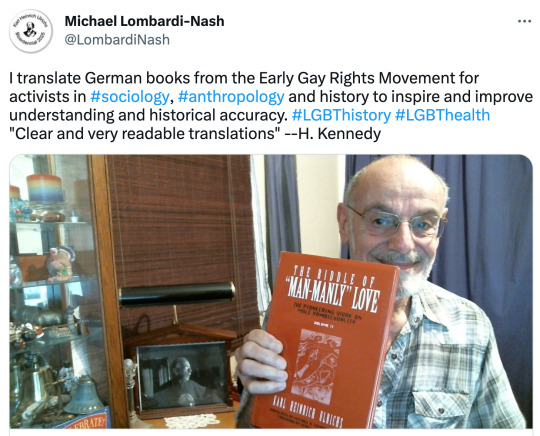
Tweet from Lombardi-Nash:
“I translate German books from the Early Gay Rights Movement for activists in #sociology, #anthropology and history to inspire and improve understanding and historical accuracy. #LGBThistory #LGBThealth
"Clear and very readable translations" --H. Kennedy”
See also: Magnus Hirschfeld's Understanding of Transgender People
#transgender#trans#queer#gay#lesbian#lgbt#lgbtqa#transphobia#history#anthropology#sociaology#lgbthistory#lgbthealth#politics
848 notes
·
View notes
Text
yeah im going all in
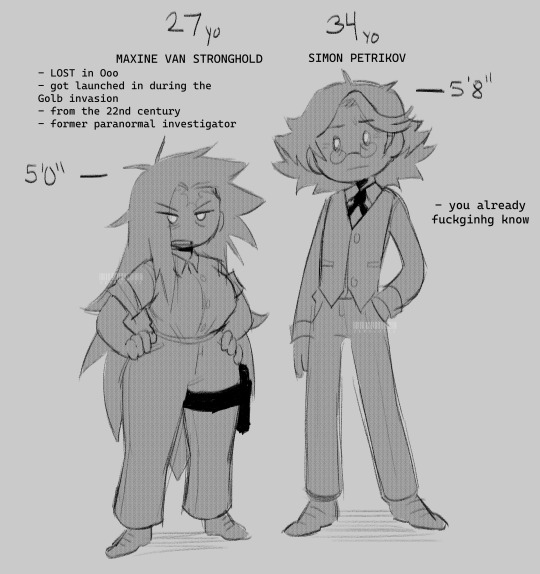
Bunch of insane lore rambles under the cut LMFAO
During the GOLB invasion, the veil between worlds became it's THINNEST. The world Max came from already had dimensional rift problems, it's the very things she was set out to study along with whatever happened to come out of them.
As we all know, Sadness attracts Madness, never did Max think that a rift would pull her in. A good 12-15 years is where she ended up getting spat back out after GOLB fused with Betty and fucked off.
She was lost for 3 months. Zero human contact. Only dangers and monsters and the occasional talking animal to point her to the human city.
She DOES eventually end up making it, stumbling on to the small ferry and falling flat in to the city. These citizens were humans, yes, but Golb knows that these aren't the same humans she's used to. They're all strange, wear strange clothes, and say strange phrases she only barely understands. You can imagine the wave of astonishment and relief she felt coming up on a giant sign that read "20TH CENTURY MAN IN HIS NATURAL HABITAT"
She's from the 22nd century, but goddamn if it wasn't close enough.
Following the curious crowd, an older gentleman stood in a dollhouse-like enclosure that mimicked that of an old fashioned home, decorated in familiar items and décor. The future-humans took their turns asking very.. Dumb. Questions. Most of the time repeating the same one in different ways. For some reason they're very focused on the different lamps. It was increasingly obvious that the gentleman acting as the 20th century man was just about ready to lose it if another comment was made about how light 'bulbs' are supposed to be pronounced light 'balls.'
"Excuse me." Max spoke up over the crowd. Simon glanced over at her from between his pinched nose bridge, pausing. It looked almost as if his shoulders relaxed. The way Max presented herself was something he hasn't seen in a very, very, very long time. Familiar clothes, cadence, and energy. "Could I talk to you, um, whenever you're done touring your.. Museum." Max asked. She was trying her very best not to make it sound urgent, despite the desperation she felt in her chest. "Oh, no, yes of course." Simon stumbled over his answer, nodding quickly. "We could talk now, if you'd like. It wouldn't hurt to close early."
The other people in group either huffed, rolled their eyes, or wandered off at the suggestion. Simon rubbed at the back of his neck, motioning Max to come inside. "Walls down." There was brief confusion, but it subsided as soon as the walls to the enclosure closed down like garage doors. Simon sighed heavily, turning to the new face in town with a tired smile. "What was it that you wanted to talk about, miss..?"
"Maxine Stronghold." Habit took over, flashing her detective badge and pocketing it in a single motion. That put the man on edge, his smile faltering. "Ah, you're not in trouble. That.. Sorry. Old habit. I was actually just here to ask if you actually were from the 20th century?" He perked back up. "Wha, why, yes. Are you not familiar with- Oh, my goodness I never actually introduced myself." Max's thick brow quirked up at him, his hand extending to her form. "Simon Petrikov. I, ah, used to be the Ice King. Difficult to imagine, I know, but rest assured-"
The increasingly confused look on the woman's face brought him to a stop. "... Sorry, did I say something wrong?"
"No." She answered slowly. "I just .. Um. I don't know where I am. Or how I got here. Or how there are wizards and talking food. I haven't had any genuine human contact in months. I was kind of hoping you'd be able to help me."
A moment of silence befell the two of them. A growing realization creeped on to Simon's face, putting his hand over his mouth and mumbling, "Oh my God." before putting a hand on her shoulder to have her sit down.
"Tell me everything."
#yeah okay so bacsically#so#arhe#aheruehha#simon petrikov#max#adventure time#fionna and cake#zerogutzz art
263 notes
·
View notes
Text
In the US, total deaths from fire and burning declined steadily and significantly over the course of the 20th century, a trend paralleled in much of the rest of the world in recent decades. Building materials are safer, open flames are less necessary for lighting and heating, and fire-response infrastructures are more robust. For most of us, most of the time, fire is innocuous, confined to stovetops and grills and lighters. There is one important exception. Beginning in World War I, modern warfare has vastly multiplied the range of available methods for burning people to death. Bullets still have their place, of course, and more ancient tactics of siege and starvation, but wars since the early 20th century have probably lit more people on fire than all prior military conflicts in human history.
Scholars often associate the rise of political self-immolation in the 1960s with the rise of television: a spectacular form of protest for the society of the spectacle. But of course there are less painful ways for protestors to attract eyeballs. The reality is that self-immolation registers the near-total impotence of protest—and even public opinion as such—in the face of a military apparatus completely insulated from external accountability. It the rawest testament to the absence of effective courses of action. When war consists primarily of unelected men in undisclosed locations pouring fire on the heads of people we will never know on the other side of the world, there is very little that ordinary people can do to arrest its progress. But we still have our bodies, and it is in the nature of fire to refuse containment.
To ask whether self-immolation is good or bad, justifiable or non-justifiable, effective or ineffective is in large part to miss the point, which is that it is an option, whether anyone else likes it or not. It illuminates our powerlessness in negative space, but it also affirms the irreducible core of our freedom, that small flame of agency that no repression can extinguish. Since Aaron Bushnell’s death by self-immolation this week in protest of Israel’s genocide in Gaza, his detractors have warned about the risk of “contagion,” suggesting that his protest will encourage imitators (who, they imply, share his alleged mental instability). There may or may not be additional self-immolators before the slaughter comes to an end, just as Bushnell was preceded by a woman, yet to be identified publicly, who burned herself outside the Israeli consulate in Atlanta in December. But the purpose of lighting yourself on fire is not to encourage other people to light themselves on fire. It is to scream to the world that you could find no alternative, and in that respect it is a challenge to the rest of us to prove with our own freedom that there are other ways to meaningfully resist a society whose cruelty has become intolerable.
Erik Baker, “Burnt Offerings: Aaron Bushnell and the age of immolation,” n+1, February 29, 2024.
#this is kind of the most major piece I’ve read in a while on anything#like I would strongly encourage you go read the whole thing right now#reading#aaron bushnell#erik baker
103 notes
·
View notes
Text
the swan and her princess (part 1)

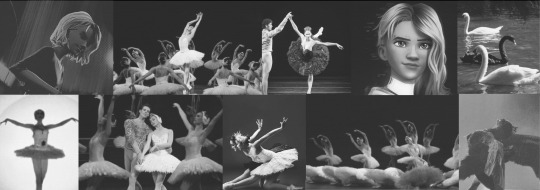

summary: Swan Lake isn’t all beauty and grace, contrary to popular belief. And you experience firsthand that as you wage a one-sided war with your “rival” for the role of the Swan Princess, Odette.
pairing: Gwen Stacy (Spider-Woman) x fem!Ballerina!Reader
word count: 842
warnings: uses of Y/N, lots of ballet terms and references, the teacher displaying blatant favouritism ig?, mildly petty reader 💀
a/n: I finally got around to doing it! yay :D academic rivals to lovers ftw honestly
gearing up for my first official chapter-based fanfic WHOOOOOOOOO
dividers by me btw! it’s my first time doing dividers so any feedback would be appreciated <3
part 1 // part 2 (pending)

glossary:
Swan Lake: Swan Lake, Op. 20, is a ballet composed by Russian composer Pyotr Ilyich Tchaikovsky in 1875–76. It is now one of the most popular ballets of all time. The ballet is based on a German fairy tale, and tells the story of a prince named Siegfried who falls in love with Odette, a princess who has been turned into a swan by an evil sorcerer
Odette: Odette is the main female protagonist in the ballet "Swan Lake," which is composed by Pyotr Tchaikovsky. She is the White Swan, also known as the Swan Princess/Swan Queen.
Anna Pavlova: Anna Pavlovna Pavlova was a Russian prima ballerina of the late 19th and the early 20th centuries. She was a principal artist of the Imperial Russian Ballet and the Ballets Russes of Sergei Diaghilev. (basically, every ballerina’s idol)
first position: In the first position, the heels are together, with toes turned out until the feet are in a large, open V or a straight line.
relevé: Relevé is a French term meaning "raised up." It is one of the basic ballet moves. The dancer starts in a demi-plié (a move where the dancer bends their knees halfway while keeping their feet on the ground) and then rises up into demi-pointe (on the balls of the feet) or en pointe (on the toes), either on one foot or both feet.

“Let’s take it from the top, Y/N. More turned out this time. And your ‘wings’ aren’t flowy enough. You are the very Swan Princess, not a struggling cygnet. You die gracefully.”
You blew air threw your nose a little more forcefully than you usually would, trying your best to follow your ballet teacher’s instructions.
“Ah, Gwendolyn! So nice of you to join us.”
That statement was usually used sarcastically in most settings. So why did your teacher’s voice take on a note of adoration? You resisted the urge to roll your eyes, not even looking at the new arrival. All she ever did was drop into class half an hour late - without even doing her hair in a proper bun - and get showered with praises for everything she did. Always Gwen this, Gwen that. You were so sick of it.
“Gwen, if you decide to try out, you would be a perfect fit for the White Swan,” Your teacher eagerly told her, and your ‘flowy feathers’ tightened into fists. Just brilliant. In her eyes, you had no chance at Odette, did you? Once again, Gwendolyn Stacy would swoop in and snatch up something you had worked so hard for, spending hours upon hours on late nights at the studio practising alone, all because the teacher thought she was the next Anna Pavlova. But every time, you bit your tongue and kept your head down. One day, you would show them. You would show them all how good you were. And little Gwendolyn Stacy, the number one teacher’s pet, would watch and weep.
You cleared your throat to jolt your teacher out of her rambling. “Miss? My audition?”
She blinked as if she were just noticing you. “Ah, right. Yes, you may continue.”
You were ready to hurl your pointe shoes at both of their annoying faces, but you focused on making yourself extra turned out and extra graceful. Oh, how the tables would turn when you got this role.
You risked a glance out of the corner of your eye and noticed with a smug satisfaction that Gwen was staring at you, eyes wide. Completely enthralled.
Ha-ha, Gwendolyn Stacy. Look upon actual, hard-earned talent and despair.
You finished the Dying Swan - the Swan Lake piece you were doing for your audition - and bowed, standing in first position with your head held high.
“Thank you, Y/N. That was very nice. Everyone, let’s get started. Get your shoes on and get into your positions at the barre, please.”
Ugh, the barre positions. Your arch-nemesis, apart from a certain Gwen Stacy. Well, maybe not apart from her, since your barre position was right in front of her.
“One, two, three, four - hold, two, three four…”
You tuned out the voice of your ballet teacher; the exercise was purely muscle memory to you by now, and her voice was only distracting you at the moment.
“Hey, Y/N.”
You were pulled out of your intense focus by the voice behind you. Once you realised who it was, you had to resist the urge to scoff. “What is it?”
“I, uh… I just wanted to say that you did amazing. It was very graceful. You’ll make a good White Swan.” That almost made you lose your balance in a relevé and twist your ankle, because what?
Gwen Stacy thought that you’d get the role?
Oh. That was new.
Or maybe it wasn’t, and you were just imagining the whole ‘undeserving slacker’ thing and painting her as the bad guy…?
You almost giggled at that. Nah. This was definitely some ploy to get you to relax a little, to stop practising almost obsessively. Yeah, she was just trying to ensure you weren’t a threat. The moment you let down your guard, she would snatch up the role of Odette. You just knew it. Well, she could try all she wanted; you would not make it easy for her.
“Oh, I know,” You replied coolly, ending the exercise with everyone else and turning to offer her a politely bored smile. “But thank you.”
Gwen’s smile dropped a little and her eyebrows scrunched together slightly, her piercings glinting in the studio’s warm light. “Okay, well… I’ll see you around, I guess.”
She reached down and grabbed her duffel bag, unceremoniously dropping her teal pointe shoes into the mess of clothes and who knows what else she kept in it.
You kept your eyes on her until she disappeared out the studio’s door after a quick goodbye to the teacher. She was like a ghost, always appearing and flickering out just as quickly as one. And somehow always getting away with it, every single time. Not to mention… she was also somehow really good. Despite missing classes and coming late.
“Remember, class. Now that I’ve seen all your auditions, the roles will be up next week. Don’t be late,” your teacher called as you all left the building.
You kissed your teeth in annoyance. Yeah, don’t be late. Unless you’re Gwen Stacy.
Good grief, that girl would be the death of you.

Taglist: (reply to be added!)
@hobiebrownismygod @l0starl @therealloopylupin2099

#⋆·˚ 🌹 ༘ * — 𝗻𝗶𝗻𝗶’𝘀 𝙧𝙤𝙨𝙚𝙨!#⋆·˚ 🌺 ༘ * — 𝙝𝙞𝙗𝙞𝙨𝙘𝙪𝙨𝙚𝙨!#across the spiderverse#atsv#atsv x reader#gwen stacy#spider gwen#ghost spider#spiderverse gwen#gwen stacy x reader#gwen stacy x fem!reader#gwen x reader#spider gwen x reader#gwen stacy x y/n#gwen stacy x ballerina!reader#ghost spider x reader#gwen stacy imagines#ballerina reader#ballet fic#atsv ballet class au#ig?? idk#also i LOVE making matching headers + dividers#ITS SO FUN WTF???#these ones might be a little bit overkill but i like it#anyway#i’m going go to take a nap now#byeee
129 notes
·
View notes
Text

Do what thou wilt shall be the whole of the Law.
Nuit and Hadit are two deities in the religion of Thelema, an esoteric philosophy popularized by British occultist Aleister Crowley in the early 20th century. Nuit is a goddess representing the universe, while Hadit is a god representing the center of the universe and all points of space and time. Nuit is described as the “Empress of Space,” evoking limitless openness and possibility. In contrast, Hadit is described as a “lord of limitation,” evoking constriction and containment within a particular point in space and time. Together, Nuit and Hadit symbolize two aspects of the spiritual experience, namely, the divine expansiveness and the individual’s journey of growth and self-awareness within a particular context. Through harmonizing both aspects, the Thelemic philosophy seeks to unify space and time, mind and body, and the earthly and spiritual realms.
The interplay between Nuit and Hadit is said to create the universe. Nuit is the primal power of the universe, the forms of undifferentiated unity and infinite potential while Hadit is the individual force that establishes perspective and brings into existence individual and finite phenomena. By uniting these two principles, Nuit and Hadit create an active interplay that results in a balanced and harmonious universe. This interplay of Nuit and Hadit is often represented as a yin-yang icon. This interplay includes all of the opposing yet complementary forces that exist in the universe, such as beauty and ugliness, good and evil, life and death. This interplay allows for the development of dynamic and creative existence, providing a base from which all manifestation can occur.
The precise details of what constitutes the “Great Work” will depend on each individual’s own spiritual journey and understanding. While there is no one definitive answer, it could be said that Nuit and Hadit, when reunited in consciousness, can bring forth divine wisdom and understanding, enabling the individual to realize the interconnectedness of all things and to live in harmony with the universe. This reunion is not merely a physical process, but a spiritual one. It calls for the understanding of the individual and the understanding of the Universe to unify and become one Understanding .
This can only be achieved after a long process of the individual committing themselves to the process of self-development and inner exploration. This is done through contemplation, meditation, magick, and various other spiritual practices that help to bring forth the truth within. As one moves through the process and develops a true understanding of the universe and their place within it, they can begin to realize the great potential of their own creative power.
We call on Thelemites to unite their divine expansive nature, symbolized by Nuit, and their divine contractive nature, symbolized by Hadit, within themselves and to dedicate their will and life in pursuit of the Great Work. The stellar union of these two powers will bring Light and the full realization of one’s greater nature and purpose. In those moments of divine illumination, one should also give heed to the highest promise of the Great Work — to go out into the world and enjoy life to the utmost. Let us, then, leap out into life and manifest the joy of Thelema in every moment.
Love is the law, love under will.
Nuit & Hadit
@noeasyvision
The elements are Nuit—Space—that is, the total of possibilities of every kind—and Hadit, any point which has experience of these possibilities. (This idea is for literary convenience symbolized by the Egyptian Goddess Nuit, a woman bending over like the Arch of the Night Sky. Hadit is symbolized as a Winged Globe at the heart of Nuit.)
“Introduction” to the Book of the Law
51 notes
·
View notes
Text
Fic: I choose you as my man - BuckTommy
Title: I choose you as my man
Fandom: 9-1-1
Rating: Teen and Up Audiences
Pairings/Characters: Evan "Buck" Buckley/Tommy Kinnard
Summary: Buck wants another date with Tommy before the wedding.
Timeline: post 7x05
Word Count: 1,382
Disclaimer: I claim no ownership over these characters. I am merely borrowing them from Reamworks, Brad Falchuk Teley-Vision, Ryan Murphy Television, and 20th Century Fox Television.
Betas: Thank you to @medieshanachie for looking this over for me.
Author's Note: Title from "Take Me As I Am" by Wyclef Jean from Love, Actually soundtrack
Read on AO3
Buck couldn't believe he had as many butterflies in his stomach as he did as he adjusted the placement of the popcorn bowl on the coffee table. He glanced up at the television to where the movie was waiting to be started.
He grabbed a couple of coasters and set one on either side of the popcorn bowl because he was an adult and didn't want rings on his table from when the beers that were still in the fridge inevitably began to sweat.
He didn't know why he was so nervous. It wasn't like this was the first time that Tommy had been to his loft. Then again, this was the first time he was coming over for a date.
He felt the smile begin to grow as he thought back to the last time Tommy had been here. To when he'd turned Buck's world upside down with that kiss. The kiss he hasn't been able to stop thinking about since it happened.
He really hoped that they would kiss again tonight. And boy, did he feel fourteen years old again, just hoping for a kiss.
Before he could get too lost in his thoughts, there was a knock at the door. Buck smoothed down his polo shirt and hurried to the door.
"You're here," Buck said, holding the door open for Tommy. A thrill raced down his spine as Tommy gave him an appreciative once over. One he couldn't stop himself from returning.
"I'm not too early, am I?" Tommy asked, stepping inside.
"N-No, you're right on time," Buck answered, closing the door. "Go ahead and sit on the couch and I'll grab a couple of beers."
Tommy's rich laughter boomed when he saw the TV. Buck grinned to himself as he hurriedly opened the beers and joined him.
"You've been talking to Howie about me?" Tommy guessed as he accepted the beer Buck held out for him.
Buck dipped his head and looked up at Tommy through his lashes. He heard Tommy's quick intake of breath at the gesture but ignored it. "Well, he has known you the longest."
Tommy's bright eyes dimmed a bit. "Yeah, I was a different man back then," he said.
"Don't worry, he told me that, too," Buck assured him, reaching out to squeeze his - very muscular - arm.
"How'd that conversation go?" Tommy asked, somewhat nervously.
Buck gestured towards the couch and they sat, both turned to face the other.
"I pulled him aside during a slow period at work and told him that I was bringing you as my date for the wedding," Buck said.
"I wish I could have seen his expression to that announcement," Tommy said. "I wasn't out to anyone when I was with the 118."
"This was also how he found out that I'm bi, since I'd never been on a date with anyone who wasn't a woman before you," Buck admitted.
"And you chose a fire station as the place to come out to him?" Tommy asked, eyebrows raised. "Howie can't keep a secret to save his life."
"Which is why he was the last one on my team that I told," Buck said. "Not on purpose, but it just kinda ended up happening that way. I was kinda almost hoping that Maddie would let it slip, but unlike her fiance, she can keep a secret." Buck paused, then rushed to say, "Not that I'm keeping us a secret. I'm not ashamed that I'm bi, or to be going out with you. After all, I'm bringing you to my sister's wedding. To Chimney!"
Tommy reached out and rested a hand on Buck's knee and squeezed. "Relax, I didn't think you were."
Buck took a deep breath. Not just because of how good it felt to have Tommy's hand on his leg, but also to release some of his nervous tension.
"Anyway, once that news sunk in he was so excited that we're going out and couldn't wait to share with me some of your favorite things," Buck said, glancing at the TV. "And I figured that since we missed the movie last time, that we should start with one of your favorites."
"Have you seen it?" Tommy asked, resituating himself on the couch to better face the TV.
Buck grabbed the popcorn and remote and did the same, scooting closer to Tommy, but with a couple of inches still between them.
"I used to watch it with Maddie," Buck said. "She loves it, too."
"But you don't? We can watch something else if you don't. I'll have lost some respect for you, though," Tommy teased.
"I do," Buck confirmed. "Who doesn't love a movie about people falling in love and the hope that being in love inspires?"
"Exactly," Tommy agreed, stretching an arm out behind Buck on the couch as he settled more comfortably.
Buck eyed the arm behind him and just grinned to himself, having pulled that move himself way too often, pleased to be on the receiving end of it. He felt the heat rise on his cheeks.
He raised the remote and pressed play before setting it on the coffee table.
As he sat back, he spread his legs just a bit so his knee was lightly pressing against Tommy's. The other man didn't say anything, but Buck felt him press his knee a little more into Buck's in acknowledgement. A pleasant shiver ran down Buck's spine as Tommy brushed a thumb against Buck's shoulder.
Buck glanced at Tommy from the corner of his eye and he was smiling. Whether that was because of Buck's reaction or the movie, Buck wasn't entirely sure.
He grabbed a small handful of popcorn and tossed it in his mouth. As he automatically began to lick the lingering butter and salt from the palm of his hand, he suddenly realized that he'd forgotten napkins. He leapt to his feet to find Tommy staring hungrily at him.
"I-I forgot napkins. For the popcorn," Buck stuttered.
Tommy looked from Buck's buttery lips to his fingers. "I think I can help with that," Tommy suggested, reaching out for Buck's right hand; the left still holding the popcorn bowl.
Buck blindly set the popcorn on the table as Tommy pulled Buck back down next to him, much closer than before.
Keeping his eyes on Buck's, Tommy sucked one of Buck's fingers into his mouth, swirling his tongue around each one until it was cleaned of butter and salt.
Buck could barely catch his breath as he watched Tommy suck each of his fingers clean. His dick took an interest as well, suddenly wishing for Tommy to suck that appendage as well. It took all of Buck's effort to not glance down to see if Tommy was enjoying this as much as Buck was.
"That was so hot," Buck breathed when Tommy finished.
"Oh, I'm not done yet," Tommy promised.
He reached out with the same two fingers as last time and pulled Buck into a kiss.
Buck whined with relief to be kissing Tommy again, letting himself rest the hand that had just been in Tommy's mouth in his shoulder, his fingers digging in as Tommy's tongue flicked against his lips. He parted his lips and they both moaned as Tommy's tongue brushed against Buck's.
When they pulled apart a few minutes later, Buck panted, "This isn't why I invited you over tonight."
"You sure about that?" Tommy teased.
"Well, not the only reason," Buck admitted. "I hoped. I really hoped. But I also just want to spend more time with you."
"You don't hear me complaining, do you?" Tommy asked, running his fingertips along Buck's shoulders and upper back.
"N-n-noo," Buck said with a shuddering breath. "How do you do that to me?" he muttered quietly.
Tommy chuckled. "I remember what it was like when I first admitted that I was attracted to men."
Buck's wide eyes met Tommy's smiling ones, his fingers running down Tommy's arm. "Is it like this for everyone?"
"I can only speak for myself," Tommy said. "But in my experience, when you click with the right person, yes."
As if to prove his point, Tommy leaned back in and captured Buck's mouth again.
It was a good thing that they'd both seen the movie before.
The End
35 notes
·
View notes
Text
TSHOEH au
Sirius Black, one of the most famous actors of the 20th Century. A womanizer of sorts. The media loves him, his family? not so much.
Wherever he goes, tragedy and drama follow. He's smart, he's cunning, he's charming, he's manipulative. He goes after what he wants and he always gets it.
He's had seven wives, or at least that's how the story goes. Everytime, he's pictured with some different woman. He never really manages to stay with the same one for very long.
He's never been one for subtlety. Always loud and obnoxious and transparent.
At least that's what the media thought of him.
An old Hollywood legend, friends- with the likes of James Potter, Lily Evans, the directors Mary McDonald and of course his own brother he rescued from their abusive parents, Regulus Black.
They're like a galaxy by themselves. Always revolving around one another. All of them stars, but Sirius burns the brightest.
Near the end of his life, he hires his godson to write his memoir. And so Harry Potter, son of James Potter and Lily Evans, writes the story of Sirius Black, his seven wives, James Potter and his "marriage" to Lily Evans and the peculiar case of Regulus Black.
The public goes crazy, naturally.
The book goes through Sirius' life. At first, how his parents were abusive, how Sirius learned the traits he mastered later to be a good liar, mostly as a survival tactic.
Harry has written about how eventually it got so bad, Sirius had to run away to his best friend's house. Fleamont and Euphemia Potter, both being in the film industry had no problem introducing James and Sirius as new talents. Nepotism gets you everywhere.
The book goes onto how Sirius starred in his first movie with James, something about two young boys during the World War. Sirius had finally found his calling. He loved it, the cameras, the attention, the articles. He absolutely loved it and he used his fame for everything.
After the release of his first movie, he gets a letter, just two words. Sirius, help. And so he does. Regulus was an adult by then, and yet unable to escape the grasp their parents had on him. So Sirius did what his baby brother asked. He helped.
The papers went crazy with that one. "FILM STAR SIRIUS BLACK KIDNAPS BROTHER FROM FAMILY HOUSE" It only makes Sirius laugh harder. Because the papers have always been wrong. There hasn't been a single thing in his life the Papers have been right about and if there was, it was because Sirius had laid all the answers in front of them, waiting for them to piece things together.
In any case, he continued his rise to fame. James' second movie was with an actress their age with flaming red hair and just as fierce a personality. James had been in love since the moment he laid his eyes on her.
Lily Evans had come from a poor background, with none of the connections Sirius and James had. And yet she'd proved herself multiple times.
They dated for a while in their early twenties, but it didn't seem to work out so they stayed friends.
Sirius' third movie, Regulus' first, was directed by a woman Sirius was first tongue tied around. Not in the romantic sense, Sirius had just never met a female director until then.
Mary McDonald was a force to be reckoned with. If Lily had been fierce, Mary was a whole different story.
As unprofessional as it was, they dated for a while. The papers had a field day with that as well. "MARY MCDONALD, DIRECTOR SLEEPS WITH ACTOR FOR CONNECTIONS"
Sirius never paid them much mind. He got what he wanted from Mary and so did she. When they eventually stopped dating because they figured out neither liked the other romantically, they continued to stay friends.
When Lily won her first well deserved award, they went out to celebrate. Just them. James drove, Sirius in the passenger seat, Regulus suffering in the backseat grumbling about how he'd rather be anywhere but there.
That's not to say the others weren't successful. James had girls wrapped around his finger, millions would literally throw themselves at him. And yet he never reciprocated, never went out with anyone after Lily.
He was a successful actor in his own right, films after films after films. He was a diverse actor, anything from biopics and romance to tragedy and comedy.
Regulus acted in plays mostly, though he did his own share of films. The public loved him, word on the street was- men mainly.
So they drove and drove to the middle of nowhere. Just Sirius, James, Regulus, Lily and Mary. Until they stopped at some shitty diner surrounded by nothingness as far as the eye could see.
That's where Sirius met Remus for the first time. Just a waiter, a snarky one that seemed to have no idea who they were and was downright rude to Sirius at times.
And still, they all came back. Again and again and again. When Mary won her first award for one of her films, when Regulus won awards for the musicals he starred in, when Regulus ditched theatre entirely and moved to music, when Sirius won his first golden globe- again and again and again. Somehow they always ended up in that diner.
Which is how Sirius found himself visiting the diner alone sometimes, just to get to talk to Remus in that small town where no one knew him. Which in turn is how he found himself in bed with Remus more times than just once.
So when Sirius won his first Oscar, he dedicated it to his Moony of course. And the public went wild as they had a reputation of. "ACTOR SIRIUS BLACK'S NEW SWEETHEART?"
It's not that Sirius hadn't dated before Remus. Hell, he'd even had a Vegas wedding with a fellow actress, a small wild fling with a famous singer and he'd lost track of all the women who wanted him. But this was different. As the times were, he knew the two of them would never be able to live as they wanted. Fame had given Sirius everything he wanted and yet it couldn't give him Remus.
They broke up, they made up, they got back together. Again and again and again.
Later, Sirius wondered why they wasted so much time.
Sirius caught James and Regulus in the bathrooms at the Grammys once. He'd groaned in disgust and made a huge deal out of it, teasing the two endlessly.
Regulus had been beetroot red even as he got on stage to collect his award. James had just hung his head in shame in the audience, only looking up during Regulus' speech where he thanked Sirius and "the sun" whatever that meant.
They were always in each other's orbit. Whether it was because James, Regulus, Lily and Mary wanted a child they decided to coparent, or simply because they were all just best of friends.
Remus didn't like the fame part much, but he tolerated it for Sirius' sake.
As always, rumors arose and so Sirius had to deal with them. He went in public, flirted with a few women, got into pr relationships and a few pr marriages over the following years.
His last marriage was to Mary, or rather his last legal marriage. Because in his heart, he'd been married to Remus as long as they'd been dating.
Fame trickled away, as it usually does. But they were immortalized for their works.
And now, after all of them had gone, Sirius would immortalize them for the right reasons. He wanted to tell the public their real story, not the one they had been acting in for decades.
And so Harry Potter wrote his book.
#remus x sirius#sirius#marauders#regulus black#marauders era#james potter#dead gay wizards#hogwarts#sirius black#the marauders#jegulus#starchaser#remus lupin#tshoeh#evelyn hugo#the seven husbands of evelyn hugo#mary mcdonald#wolfstar
34 notes
·
View notes
Text
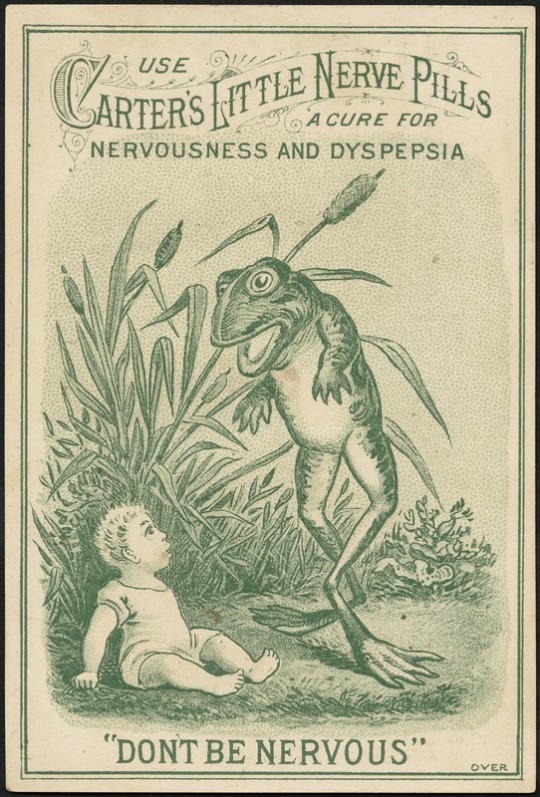
Does this frog make you feel calm?! Or perhaps like you have been mildly poisoned with henbane?
Please enjoy these extra notes regarding things that appear in my Shameless Big Bang fic Last Night at the Verona Grand Hotel, in order of appearance. Also now listed in the work endnotes on AO3 (but without the pictures).
This post contains lots of spoilers for the fic.
The train that Mickey takes from Chicago to Los Angeles is an Amtrak route called the Southwest Chief.

Mickey reads Treasure Island as a reference to Loftec’s fic Take this waltz.
The green popsicle is Melona.
I went for fictionalized geography around where exactly the hotel is, but the descriptions of the view on the drive up are based on pictures of Los Liones Trail.

The Verona Grand is, of course, inspired by the early years of the Chateau Marmont, but also crossed with a creepy old hotel I’ve stayed at in Colorado. The name is a reference to the setting of Romeo and Juliet plus the Neptune Grand from Veronica Mars (for that sunshine noir energy).
The Mark of Zorro (1920): Full disclaimer, unlike Mickey, I didn’t watch the whole thing (I didn’t have the good incentive of looking for my crush), but the moments I referenced are here and here.
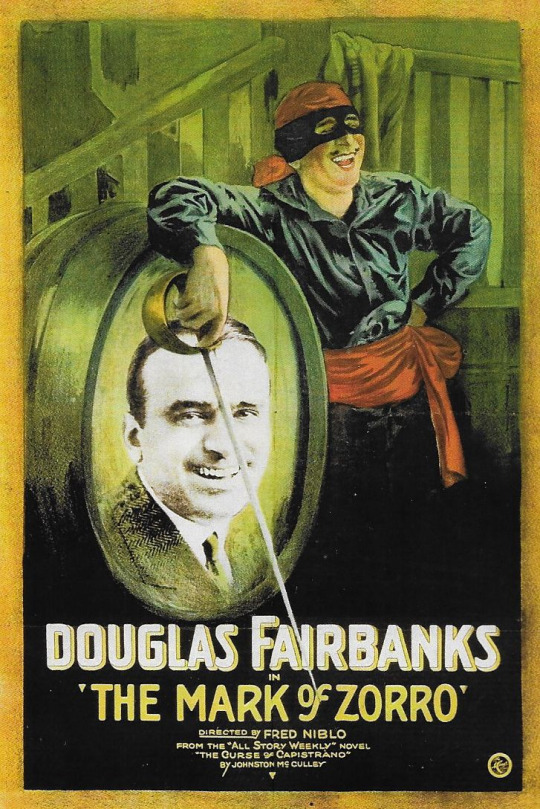
(About ten years ago, I went to an outdoor movie screening that had been advertised as The Mask of Zorro but turned out to be The Mark of Zorro; after about 30 minutes, we all gave up and went home. Sorry, Douglas Fairbanks! We wanted Antonio.)
Hunter’s name is a reference to 1950s actor Tab Hunter, who came out as gay in 2005. (One of his long-term relationships was with Anthony Perkins of Psycho fame, after they met at the Chateau Marmont.)
KY Jelly has been around since the early 1900s (!). Here’s some of the vintage packaging. We’ll just assume Mickey was distracted and didn’t look too closely at the tube (or thought it was pretentiously packaged hipster lube; thanks for that idea, Deanna!).
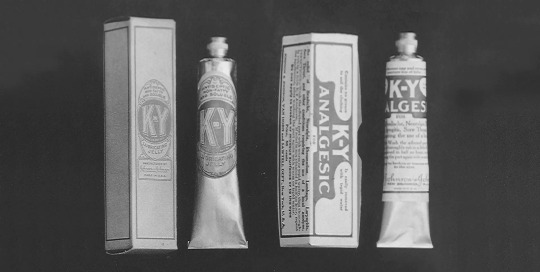
Mickey calls Davie “Nurse Ratched” as a reference to One Flew Over the Cuckoo’s Nest; the actress who played her in the original movie, Louise Fletcher, played Frank’s mother in season 2 of Shameless.
Nerve pills: These are fictionalized (I don’t know how well they worked or what they tasted like; probably not nice!) but they’re based on Carter’s Little Nervine Pills, the active ingredient of which was extract of hyoscyamus, which (if my Googling is correct) is henbane. Henbane is quite toxic and can cause hallucinations. It was commonly associated with witchcraft, since ointment made with it could cause people to see things and feel like they were flying. Never change, early 20th century medicine.
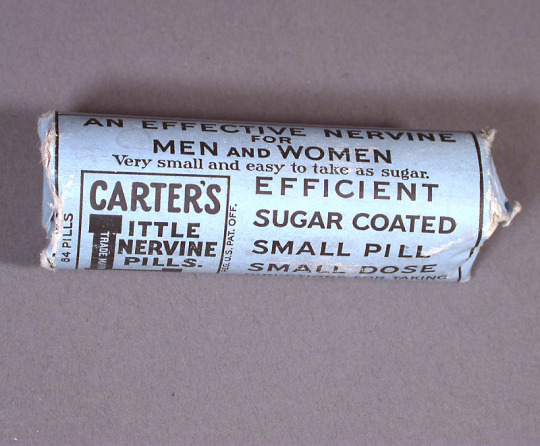
Another one of the compounds in henbane is scopolamine, which can be used to treat motion sickness. This worked well for my purposes because I had decided that the sickness Ian and Mickey experience when they stay in the wrong time is a cousin to motion sickness (if traveling through space too fast can make you feel sick, why not traveling through time?).
The concept of quantum entanglement is the other one in my mind when I think about what “connects” them each to their own time, but don’t ask me any follow-up questions on that, because honestly I’m not great at physics and I don’t totally understand it. Storytelling-wise, I just like the idea of things being connected to each other on a submolecular level. I refer to this in Two of Your Earth Minutes, as well, for the same reason.
Mickey also makes a reference to the idea of the observer effect. (Lotta quantum mechanics in this dang ghost story!!)
The new movie Ian is going to audition for is A Woman of Paris, directed by Charlie Chaplin.

I think he would have gotten it, don't you?
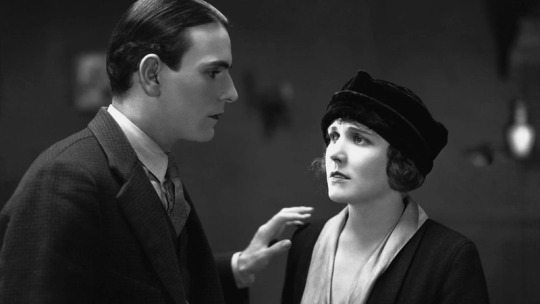
28 notes
·
View notes
Note
hello! i am a longtime huge admirer of your clothing/fashion sense, as well as a longtime backreader of your #victorian and #goth tags. i am really interested in what you've written about Victorian dress, and i am looking to get more into 19th and 20th century clothing for gender + diy craft reasons. i'm so sorry if you've answered similar questions before, but do you have any tips for where a newbie should start researching? either way, thank you thank you, your blog opens my mind wide and brings me much joy and reflection!
General research:
Spend some time searching the 'net, museum websites, and archive sites for fashion plates (such as archive.org—link leads to a date-restricted query for "fashion"—or the Smithsonian—link leads to fashion plates in their image collection). Take note of what you like, as well as which styles correspond to which decade. Karolina Żebrowska has a good rundown of English fashion over the decades.
The undergarments are what does the most work creating the necessary silhouette to make Victorian & Edwardian womenswear fit properly. If you've figured out a decade you want your outfit to draw on, doing a quick search for "[decade] undergarments" should bring up plenty of blog posts, which may or may not cite primary sources (such is the fickle nature of the historical blogosphere). Bustle pads and sleeve supports can be purchased or made; they're both pretty simple, and tutorials abound.
Purchasing clothing:
Reproduction made-to-measure clothing can be readily found on etsy, but can be in the several-hundred USD range. I've had some luck finding vintage reproduction clothing (like, a skirt someone made by hand in the 1980s to a 1900s walking skirt pattern), which tends to be much cheaper.
Men, women, and children wore stays and corsets. As far as I know, Orchard Corset has the cheapest OTR corsets that are good quality and safe to wear. If you get a corset in the style of a specific decade handmade or made to measure, make sure that the seller tells you what the boning material is, what construction the boning is (spiral steel is sturdiest and most flexible), how many bones there are, what the corset material is, &c.—otherwise it's an indication of an unserious maker. Follow general advice for wearing corsets at a waist reduction (lace up slowly, break it in, &c.).
Antique Menswear on youtube gives a lot of good, practical advice for wearing late 19th-century and early 20th-century men's clothing (including where to buy reproductions and how to treat them, how to modify modern shirts to 19th-century standards with basically no sewing skills, &c.).
Actual antique clothing can be found and purchased online or at estate sales—usually in very small sizes, but I've seen Edwardian skirts and petticoats in an XL (also a small size, but...). You can also just simply browse this kind of thing for inspiration and save photos of anything you think you'd like to recreate.
Even clothing that was not "meant" to be worn by re-enactors can be clearly historically influenced (e.g. the huge boom in Victorian- and Edwardian- style blouses in the 1980s), so keep an open mind when shopping for vintage clothing! A lot of 1970s dresses that look "hippy" on their own can look very Victorian with the right undergarments and an updo. A lot of 1980s men's trousers also approach the right silhouette for the 1910s-inspired three-piece suit I'm trying to put together. Witness also the recent trend for big puffed sleeves!
Making or modifying clothing:
Victorian and Edwardian manuals for garment drafting and sewing can be found online—go to archive.org and search for "sewing," "drafting," or "dressmaking," then use the filters on the left to chuse which year(s) you want to see results from. Most of these have patterns that are sort of vibes-based: The work-woman's guide is one manual that claims to have patterns laid out strictly according to a grid.
I don't sew garments, but if Victorian pattern-writing for sewing is anything like it is for knitting, that may not be super useful. People do sell updates and graded 'translations' of antique patterns (which tend to be written in only one size) on etsy and ebay—just make sure from the description that it's 'deciphered' and translated rather than a scan of the original pattern!
One of the easiest things that you can do to add some Victorian or Goth flair to an otherwise plain-looking garment is to add trim. You can knit, crochet, or tat your own trim from Victorian lace-making patterns; purchase antique trim from resale sites; or buy braided or lace trim very cheaply at any craft store. Trim doesn't just have to go around the hems and cuffs of a garment: lace "insertions" between two pieces of fabric, as well as raised geometric patterns over the surface of a garment, are common in 19th-century clothing.

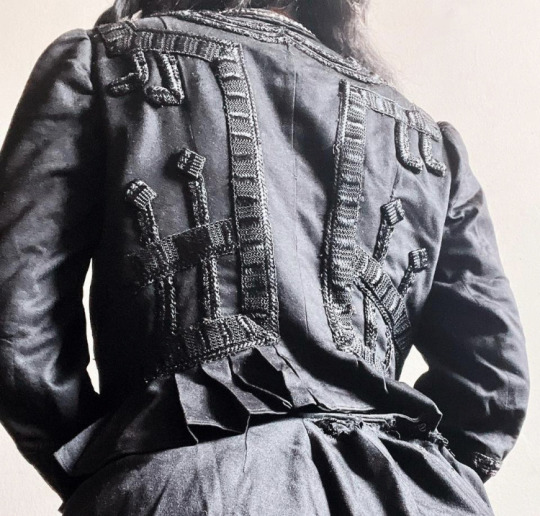
[ID: first image shows a black overdress showing lace insertions between strips of fabric of equal width, creating a striped effect. second image is the back of a black blouse with trim in a geometric design centred around right angles and parallel lines. end ID]
Jewellery (women's and men's):
Actual antique jewellery (including men's jewellery and fastenings) is not as expensive as you might think. Even if you're not willing to spend a lot of time learning what to look for and scouring estate sales for people who don't know or care what they have, late Victorian mass-manufactured costume jewellery often goes for sub-$50 or even $30 prices at auction on ebay (USD, in the US—in my experience it is even more plentiful and cheaper in the UK).
Specifically, I've lucked out with lots ("lot" as in, a bunch of small things being sold together) of "vintage men's accessories" going for $20 or so that contained Victorian cufflinks (in low-karat gold, mother-of-pearl, and jet), collar studs (in low-karat gold and base metals), and shirt studs (in low-karat gold, with garnets and seed pearls, &c.). Searching for lots of accessories is generally a good idea since by and large people do not know what these things are... but if you're willing to spend a little more for something that has been identified and is more likely to still be with its set, use the specific search term for that item (e.g. "antique collar studs").
Answers to Questions About Old Jewelry (though aimed at estate sellers and, if memory serves, full of regrettable pæans to Queen Victoria) is a good reference text to dating antique jewellery. I also recommend Miller's Illustrated Guide to Jewelry Appraising. Both of these texts are available on libgen.
Feel free to ask me follow-up questions if you want more detail on any of these points. As you can see I am perfectly happy to blather away on this topic
83 notes
·
View notes
Text
Suggestions for Tumblr's next book club
With Dracula Daily on the horizon again, I've been pondering what other out-of-copyright novels we might like to consider reading very slowly. Here are my ideas! And if any of them already exist, lmk.
North and South
Author: Elizabeth Gaskell
Year of publication: 1854-55
Length: 185,000 words, 52 chapters. So we could have a chapter weekly for a full year.
Summary: Margaret Hale is forced to leave the rural south of England and settle in the rough, industrial north. There she clashes with mill-owner John Thornton over his treatment of his workers...
Why Tumblr would like it: Enemies to Lovers! Class struggle! Fascinating historical context! Honestly, it's a great read.
Evelina
Author: Fanny Burney
Year of publication: 1778
Length: 157,000 words in 84 letters. That's right, it's epistolary, and the letters are almost all sent March to October of the same year, so we could read this one in true Dracula Daily fashion.
Summary: Evelina is the sheltered daughter of an aristocrat trying to make her way in the world of late 18th-century society.
Why Tumblr would like it: Evelina is a likeable, relatable character. I think it'd be fun to get emails from her.
The Well of Loneliness
Author: Radclyffe Hall
Year of publication: 1928
Length: 158,000 words in 56 chapters.
Summary: The story of Stephen Gordon, a girl who realises at an early age that she's a lesbian, and her attempts to find love in the early 20th century.
Why Tumblr would like it: It's one of the most iconic lesbian novels of the 20th century!
The War of the Worlds
Author: HG Wells
Year of publication: 1897
Length: 63,000 words in 27 chapters.
Summary: Alien invaders land from Mars and fuck up the south of England.
Why Tumblr would like it: Alien invaders land from Mars and fuck up the south of England, come on, what's not to like?
The Moonstone
Author: Wilkie Collins
Year of publication: 1868
Length: 200,000 words (so a bit of a marathon) in 51 chapters.
Summary: A young English woman inherits a large Indian diamond of dubious provenance on her 18th birthday. Then it gets stolen!
Why Tumblr would like it: One of the first detective novels, and supposed to be one of the best, it's a page turner with lots of suspense, twists and cliffhanger endings.
The Mysterious Affair at Styles
Author: Agatha Christie
Year of publication: 1920
Length: 60,000 words in 13 chapters.
Summary: The first murder mystery starring Hercule Poirot.
Why Tumblr would like it: Look, you liked Glass Onion, right? And if you like this, Agatha Christie's novels are emerging from copyright at the rate of about two per year.
Les Misérables
Author: Victor Hugo
Year of publication: 1862
Length: 570,000 words in the English translation (ouch) in 365 chapters.
Summary: A vast, sweeping story of poverty, justice and revolution in early 19th century France.
Why Tumblr would like it: Well, if you thought Moby Dick didn't have enough digressions...
The Canterbury Tales
Author: Geoffrey Chaucer
Year of publication: 1387-1400
Length: 24 stories averaging 700 lines each.
Summary: Some pilgrims are heading to Canterbury. They tell one another stories to pass the time. These are their stories.
Why Tumblr would like it: I mean, there's a reason we still read these 600 years later. They're a fascinating insight into medieval life, but they're also - for the most part - just good fun.
If you love any of these suggestions and would really like to see it take off, reblog to help make it happen.
#tumblr book club#north and south#evelina#the well of loneliness#the war of the worlds#the moonstone#poirot#les miserables#the canterbury tales
116 notes
·
View notes
Text
Some stuff about queer culture in Weimar Berlin
Note: Das Institut für Sexualwissenschaft does not have a definitively used translation from what I see -- have seen Institute of Sexology (my preferred translation), Sexual Science, Sexual Research, Sexual Knowledge etc. It’s all the same place.
any further suggestions, feel very welcome to add!
*
ONLINE:
the wikipedia for the institute: yeah, yeah it’s wikipedia, but get some groundwork done here if you know nothing at all, so the next set of recommendations don’t overwhelm you
Remembering Dora Richter, One of the First Women to receive Gender-Affirming Surgery: good introduction to the Institute of Sexology, with a focus on one of the women who lived, worked, and received care there
On the Clinics and Bars of Weimar Berlin: a more in-depth article about the institute, some of the people who sought to get support via it, and the surrounding culture of the time
The Magnus Hirschfeld Society: a lot of their work is published online, in German, French, and English. Hours of fun.
Interview with the author Laurie Marhoefer: discussing his book (mentioned below) Sex and the Weimar Republic, which focuses on various fronts to sexual liberation in the Weimar Republic, including the limitations of assimilationist approaches*
*Marhoefer is currently working on their third book centred on queer persecution during the Third Reich, which “centrally analyzes racism as a vector of persecution,” so that’s something to keep an eye out for too
The Asian Canadian gay activist whose theories on sexuality were decades ahead of their time: an article about Li Shiu Tong, by Marhoefer, who also wrote a book about him (see below). The title really says it all
The Transvestite Magazine of Weimar Berlin: a series of magazines that were published until 1933 when the crackdown on queer rights resulted in the destruction of the Institute of Sexology, featuring examples of voices almost completely overlooked -- transvestites who were simply living their lives
The Institute for Sexualwissenschaft: this blog post goes into something I’ve been thinking as well -- the parallels between the anti-queer/anti-trans violence perpetuated by the German government before, during, and after the Nazis and the anti-queer/anti-trans rhetoric and violence today. Where would we be if all that research had survived? (and luckily, some of it has!)
*
BOOKS
Der Liebe und Dem Leid: Das Institut für Sexualwissenschaft 1919-1933: a recent German historical account of the institute of Sexology that I desperately want to get my hands on
Sex and the Weimar Republic: German Homosexual Emancipation and the Rise of the Nazis: explores intersectional fights for queer emancipation during the Weimar Republic and its limitations
Racism and the Making of Gay Rights: A Sexologist, His Student, and the Empire of Queer Love: goes deeper into the story of Li Shiu Tong, who was an impressive researcher at the institute and whose contribution to sexual and gender philosophies is being reconsidered at the moment!
Magnus Hirschfeld: The Origins of the Gay Liberation Movement: a biography of Magnus Hirschfeld and his central role in the queer liberation movement of the time
The Masculine Woman in Weimar Germany: looks at the depictions of women who didn’t conform to standard gendered and sexual expectations from 1918-1933 and explores their role to understand gendered lives and experiences at this point in German history
The Hirschfeld Archives: Violence, Death, and Modern Queer Culture: a book I desperately want to read on anti-queer violence in the early 20th century, focusing on the Institute of Sexology and its destruction, which has gathered archival material from “over a hundred published and unpublished books, articles, films and photographs.”
Gay Berlin: Birthplace of a Modern Identity: another broader book about Berlin. I’m interested in the subtitle “birthplace of a modern identity” as potentially exploring the ways Berlin was the centre of explorations that despite the Nazis best efforts are still alive and -- with setbacks -- remembered today
Queer Identities and Politics in Germany: A History, 1880-1945: Idk what to tellya it’s about queer identities and politics in Germany between 1880-1945
*
ISHERWOOD
British author Christopher Isherwood spent some time in Berlin, notably including a stay at the Institute of Sexology. This time resulted in “The Berlin Stories,” as well as a section in “Christopher and his Kind” (his autobiography).
These stories were turned into the play+film “I Am A Camera” and the musical+movie “Cabaret”
The 1993 Alan Cumming and Jane Horrocks Cabaret (one of my favourite things in the world)
Opening of the 1972 movie
(according to a 1977 biography of Isherwood, he denounced the Berlin Stories in a 1956 essay: “He regretted depicting many persons as "monsters" and noted they were "ordinary human beings prosaically engaged in getting their living through illegal methods. The only genuine monster was the young foreigner who passed gaily through these scenes of desolation, misinterpreting them to suit his childish fantasy."” -- that being said, the people in those books are still very, very interesting and -- despite Isherwood’s initial limitations/biases -- beautiful in their realities)
*
OTHER MOVIES
Anders als die Andern and Laws of Love -- two movies produced via the institute exploring same-sex relationship rights. I haven’t seen the latter yet (it was only restored in 2021, nearly a hundred years after it was released), but it was heavily censored. The former (with the famous German actor Conrad Veidt as a lead) is considered the first movie to overtly show homosexuality. They’re both on the Internet Archive
The Einstein of Sex: Life and Work of Dr. M. Hirschfeld: by cult film-maker Rosa von Praunheim that explores the opening of the institute up until the 30s. I haven’t seen it yet, but very excited! EDIT: currently watching and it’s definitely On A Budget, but a good rundown of Hirschfeld’s life. On youtube with english subs. EDIT 2: having finished it, am interested in how it portrayed Dora Richter (that it had her in it at all was great) -- not completely accurate, but a labour of love
Paragraph 175: a 2000 movie documenting some of the gay men who experienced the violence of the law under Nazi regime and afterwards. This film is simply made, and there aren’t many men featured in it -- it feels like it’s trying to get the story told before they lost their chance completely. The stories are very brutal. It starts pre-war. One of the men talking is the French author Pierre Seel, who lived until 2005 and received recognition as a holocaust survivor in 2003, in part due to this film and his own memoir
Great Freedom: this actually takes place post-war, but another insight into what Paragraph 175 was. the main character was in a concentration camp, but it’s not depicted. I simply think it’s good, although it’s mildly off-topic.
*
MISC
this has focused a lot on the Institute of Sexology, but I’d like to read some works on Helene Stöcker and the World League for Sexual Reform
#resources#queer stuff#queer resources#weimar berlin#magnus hirschfeld#li shiu tong#laurie marhoefer#heike bauer#paragraph 175#die institut für sexualwissenschaft#weimar germany#cabaret#christopher isherwood#queer history#queer germany#germany#queer literature#queer non-fiction#queer cinema
164 notes
·
View notes
Note
What movies would you recommend for good examples of period costumes?
Ok since I could talk for literally hours about this I’m going to stick to periods that are show adjacent or relevant otherwise I’ll be here all day.
18th century (Lestat’s time):
Barry Lyndon (1975) - takes place in the 1760s throughout Europe so a little before Lestat’s time but honestly fashion changed very slowly back then so it’s pretty much the vibe we’re gonna see in s3 I believe. I think this is essential to understanding the period’s masculinity as it features mostly men and is also not about romance. You also get to see class differences in men’s dress as the character starts off in a very different social position from where he ends up. I also think Sam in his Lestat get up from set leaks looks sooo much like Ryan O’Neal in this movie I think it will be a major inspiration.
Dangerous Liaisons (1988) - this is pretty much smack dab in the middle of Lestat’s human life (pre-revolutionary) and it’s one of the few romantic dramas that actually allows its leading men to look period accurate cause somehow Hollywood decided calves and stockings were too gay for their leading men who usually show up to dinner parties in riding gear which would NEVER happen. Anyways I also think the character of Valmont is probably another big Lestat influence.
I also think movies like Amadeus (1984) and The Favourite (2018) are helpful in establishing to viewers that men did look ridiculous back then with big ass wigs and face caked full of makeup and it was not considered gay or unmanly!!
Gilded Age / Edwardian and beyond (Louis’s time):
The Age of Innocence (1993) - takes place in the 1870s so again a bit before Louis but I think now it’s important to establish that fashion trends are moving a bit faster as you’ll see a few decades later the big ass bustle look is no longer on trend but this is just a beautiful film to look at if you want a good intro to film costuming.
The trio of Merchant-Ivory’s EM Forster adaptations: A Room with a View, Maurice and Howard’s End are nice examples of early 20th century wear and again you finally get to see more class differences in dress. Also great references for men’s wear.
Daughters of the Dust (1991) - this takes place in Georgia around 1902 so getting quite close to the start of the show and it has absolutely gorgeous design like it’s the women’s silhouette so spot on. Good reference for the costumes on black women in the show. Also I think this is one case where the flowy down do’s hair in a period film isn’t anachronistic cause of the specific story they’re telling otherwise I’m usually like why are you an adult woman walking around outside with your hair down.
Passing (2021) - takes place in 1920s New York and features really lovely b&w cinematography and costuming wise it’s a really beautiful representation of upper middle class black families of the time and also has very interesting contrasts with the white upper class. Amazing book too, I highly recommend both.
For periods beyond 1930 I actually recommend just watching films from that era cause they give a more accurate representation of what was fashionable then not filtered through today’s beauty standards. For example the thin penciled eyebrow is almost never seen in modern period films cause no actress wants to shave off their eyebrows 💀 and their hair is almost always too long cause they don’t wanna chop off their hair.
Here are some good fashion recs of 30s-40s:
Trouble in Paradise (1932), It Happened One Night (1934), The Awful Truth (1937), Imitation of Life (1934), Notorious (1946), Mildred Pierce (1945), Gilda (1946), Orphee (1949), and a bunch others you can ask me for recs based on more specific criteria and I’d be happy to provide!
Also a film that’s a bit past the show’s timeline is Paris Blues (1961) starring Sidney Poitier and Paul Newman that’s also about American expats in Paris and it’s very good, everyone watch it.
#I’m sorry this is so long alsjsjakdjajajaja#but i have like 12 more I refrained from talking about cause I don’t have time I gotta run#iwtv#asks
44 notes
·
View notes
Text
The Illustrious Client pt 1
“It can't hurt now,” was Mr. Sherlock Holmes's comment when, for the tenth time in as many years, I asked his leave to reveal the following narrative.
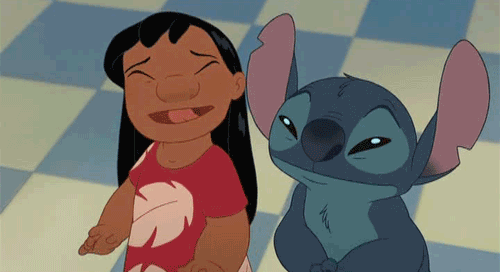
Both Holmes and I had a weakness for the Turkish bath. It was over a smoke in the pleasant lassitude of the drying-room that I have found him less reticent and more human than anywhere else.
Right, yep. That tracks.
I had asked him whether anything was stirring, and for answer he had shot his long, thin, nervous arm out of the sheets which enveloped him...
Is this an actual Sherlock Holmes story, or is it porn? I'm finding it very difficult to tell at this point.
Sir James Damery was announced. It is hardly necessary to describe him, for many will remember that large, bluff, honest personality, that broad, clean-shaven face, and, above all, that pleasant, mellow voice. Frankness shone from his gray Irish eyes, and good humour played round his mobile, smiling lips. His lucent top-hat, his dark frock-coat, indeed, every detail, from the pearl pin in the black satin cravat to the lavender spats over the varnished shoes, spoke of the meticulous care in dress for which he was famous. The big, masterful aristocrat dominated the little room.
"It is hardly necessary to describe him." - proceeds to wax lyrican for 4 lengthy sentences.
Also, Watson is getting horny on main for this masterful aristocratic dom. This story is already so horny.
My mind is a bit stuck on the lavender spats, though. That is a definite choice.
“Of course, I was prepared to find Dr. Watson,” he remarked with a courteous bow. “His collaboration may be very necessary, for we are dealing on this occasion, Mr. Holmes, with a man to whom violence is familiar and who will, literally, stick at nothing. I should say that there is no more dangerous man in Europe."
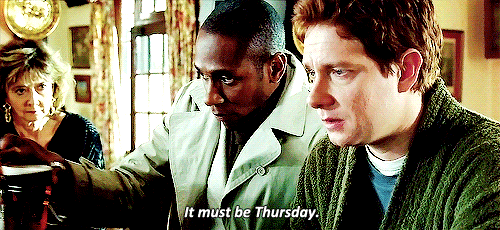
Nice that he already knows about Watson, though. Strange how many people turn up and don't know who Watson is in spite of Watson writing all these stories.
“I have had several opponents to whom that flattering term has been applied,” said Holmes with a smile.
Haven't you, though?
“Mr. Holmes, I must beg you not to press that question. It is important that I should be able to assure him that his honoured name has been in no way dragged into the matter."
People in the early 20th century need to sort out their priorities. How often have we had a rich client that doesn't want to tell anyone anything because of SCANDAL, but they still want their problem solved, don't they?

“He has a daughter, Violet de Merville, young, rich, beautiful, accomplished, a wonder-woman in every way. It is this daughter, this lovely, innocent girl, whom we are endeavouring to save from the clutches of a fiend.”
What is it with girls called Violet? The others, iirc, were at least pretty smart and on the ball. Hopefully this one will be too. It's an ill-fated name in these stories, though.
Colonel Damery needs to chill out about her, though. He's getting a little excessive.
Can't believe I only just noticed he's a colonel. And he doesn't appear to be the bad guy. Will wonders never cease? Maybe ACD overcame his prejudices.
"She dotes upon him; she is obsessed by him. Outside of him there is nothing on earth. She will not hear one word against him. Everything has been done to cure her of her madness, but in vain. To sum up, she proposes to marry him next month. As she is of age and has a will of iron, it is hard to know how to prevent her.”
Guys... I think maybe you've got to let her marry him. I know he murdered his last wife and all, but there comes a point where you've just got to accept that people don't want your help.
Clearly I'm not in a very generous mood today. Lol.
"My client, however, is an old friend, one who has known the General intimately for many years and taken a paternal interest in this young girl since she wore short frocks."
Oh, it's her gay dad. OK. That makes sense.
"I rather fancy that Shinwell Johnson might be a help.”
I have not had occasion to mention Shinwell Johnson in these memoirs because I have seldom drawn my cases from the latter phases of my friend's career.
New character alert.
...but as he dealt with cases which never came directly into the courts, his activities were never realized by his companions.
I really hope he's already dead, because if he's not I bet his companions are about to realise his activities pretty damn quick.
“Who knows, Watson? Woman's heart and mind are insoluble puzzles to the male. Murder might be condoned or explained, and yet some smaller offence might rankle."
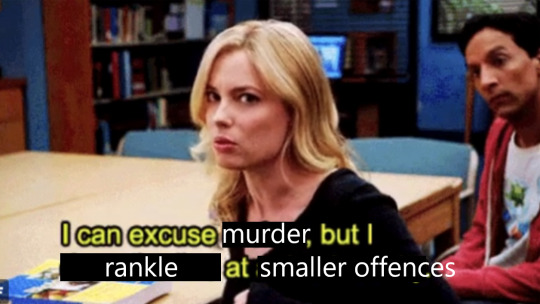
"He has breeding in him—a real aristocrat of crime, with a superficial suggestion of afternoon tea and all the cruelty of the grave behind it."
Love this line.
“‘Excuse my amusement, Mr. Holmes,’ said he, ‘but it is really funny to see you trying to play a hand with no cards in it. I don't think anyone could do it better, but it is rather pathetic, all the same. Not a colour card there, Mr. Holmes, nothing but the smallest of the small.’"
Why do these villains always insist on acting like villains? Surely it's always better to pretend not to be a villain until the last possible moment.
"'You have heard of post-hypnotic suggestion, Mr. Holmes? Well, you will see how it works, for a man of personality can use hypnotism without any vulgar passes or tomfoolery.'"
He's literally just coming out with 'she's hypnotised btw'??
Holmes came in with no cards and you're just telling him everything, huh?
And then a direct threat? Twirl your moustaches, my man. Why not laugh maniacally while you're at it.

IMPORTANT ADDITION FROM THE SECRETARIAL CAT:
aaaaaaaaaaaaaaaaaggggggyhhfd
hhhhhhegwuyikkkkkkkkkkl;;pppppppp
30 notes
·
View notes
Text
“As late as 1970, college men outnumbered women 8 to 1 in expressing interest in careers in engineering, medicine, and law. By the mid-1970s, however, a sea change had occurred. The number of women planning to enter traditionally “feminine” careers, such as elementary school teaching or nursing, fell from 31 percent to 10 percent. In the meantime, women’s applications to law and medical schools soared 500 percent, and by the mid-1980s, entering classes of medical, law, and business schools were 40 percent female.
The percentage of new women doctors increased from 9 percent to 22 percent from 1971 to 1981, while the proportion of women Ph.D.s leaped from 10 percent to 30 percent. Thirty years earlier, virtually all these women would have been entering “women’s” jobs, with low prestige, limited chance for advancement, and poor pay. Now they were becoming increasingly competitive with men for high-paying, high-status jobs in the most prestigious professions. Once again the feminist movement seemed to have made a significant impact, supporting a very different idea of who a woman was, and what she could aspire to be, than had existed just a few years earlier.
Less related to feminism and perhaps more a consequence of the general “liberation” attitudes of the 1960s was a significant change in women’s sexual behavior as well. There have really been two sexual revolutions in the 20th century. The first came in the early 1900s, when there was a significant increase in the number of women engaging in premarital intercourse and expressing satisfaction with their sexual experiences. Use of birth control also increased at that time.
By the 1970s, however, the first revolution seemed mild. The number of women who believed premarital sex was wrong fell from 75 percent in 1969 to 53 percent in 1974. Among younger women, especially, sexual behavior became much more similar to those of men, with approximately 75 percent of women and men becoming sexually active by the age of 17.
…Ms. was particularly effective in the way it recognized and endorsed women’s gradual yet startling realization of their own condition of inequality. The letters column were full of stories describing the “click” that suddenly made a woman realize she was a victim, playing a part assigned to her by someone else, and thus denied her own voice and autonomy. It might come in the middle of the night when a woman’s husband woke her saying, “The baby’s crying, honey, you’d better see what’s wrong” or when a young man persisted in making romantic advances after the woman said to stop.
But the “click” was there in a thousand manifestations that, through the medium of Ms., now became the common property of women throughout the land. Not only was it okay to be a feminist, but it was a fact of life and a truth that readers could not imagine having missed for so long. Ms. became one of the staples of many women’s lives, just as McCall’s once had been. Only now the message was very different.
Even Hollywood stars became involved in promoting a different vision of how boys and girls should grow up. Led by actress Marlo Thomas, a group of entertainers concerned about how children were socialized into traditional roles of passivity (female) or aggression (male) by most fairy tales and children’s books decided to celebrate diversity and autonomy. A record album, “Free To Be You and Me,” was a series of songs, by stars everyone recognized, that told boys and girls it was all right for them to be whomever they wanted to be.
Crying was something good for both boys and girls to do. Participating in sports, playing with dolls, and dressing up were also good. Dr. Benjamin Spock, the pediatrician who wrote the nation’s leading advice book on how to raise children, even changed some of his counsel to young parents when he became aware that some of the old stereotypes of how to treat boys differently from girls were not only wrong but harmful.”
- William Chafe, “Responses.” in The Road to Equality: American Women Since 1962
14 notes
·
View notes
Text
Medicine in Castlevania
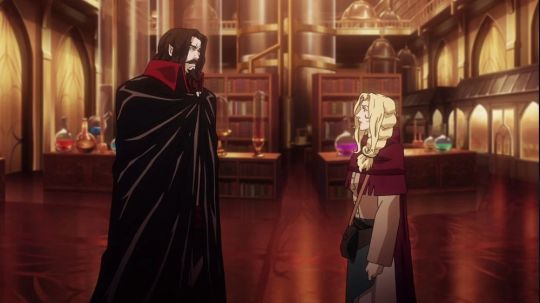
Had a talk about this topic with @autumnmobile12 and promised I was gonna write a bit about it.
There is the big question, what kind of medicine the vampires have available in the Netflix version of Castlevania. After all Lisa goes to Dracula to learn about medicine and does so. And we know that the knowledge available is far ahead of the time that the series is set (mainly 1475 and 1476).
We see a lot of chemical equipment in Dracula's laboratory, but of course we cannot say, what it does.
The one thing we know is that they know about antibiotics. This is based on Lisa giving the old woman in the village a medication for her cough made from mold. Which is fairly certainly penicillin.
Given how penicillin in the real world was discovered, we can assume two more things from this. In the real world it was discovered, by some spores from a certain kind of mold (one, that primarily grows on melons and sometime on citrus fruits) getting on a petri dish, where they were cultivating bacteria cultures, and then killing the bacteria. Hence, them knowing about penicillin does imply that they know about how to grow bacteria cultures - and hence know about bacteria. After all you would not give someone antibiotics without knowing about bacteria!
Another thing we know is, that Lisa in her own laboratory in Lupu has a centrifuge. Usually centrifuges are used either in some chemical processes, but more likely is, that it is used in blood tests. Which would make it clear that they have some knowledge of the components of blood. This also does imply that they can draw blood in a somewhat orderly manner.
So, in the real world penicillin was discovered in 1928, while blood tests go back to the 18th century.
Some other stuff that was discovered medically in the early 20th century would be insulin (which originally was made from the organs of animals, which I absolutely could see to be something that the vampires in Castlevania have figured out) and vitamins and their importance for the human body.
In the about 100 years before that, other important stuff was discovered. Aspirin being one such thing, as it was originally made from the bark of willow and I very much assume that they have already access to. X-Rays, too, being such a thing. Though I am not entirely certain about these, because while they do have electricity, I am not entirely certain how much they understand about electricity. Something I am rather certain about is general anesthesia, which was discovered in 1849 in the real world.
Vaccines were discovered technically in 1799, but it took until 1890s, until they figured out to prepare dead vaccines, that would just train your immune system, instead of giving your a minor infection. But yes, I am fairly certain that they do know about vaccines.
Some other discoveries, that would be around in the 1920s, are kinda dependend on how well the understanding of electricity is. Because the only electricity we see is in electric light. So, it is hard to say whether they have electro cardiography for example. Though obviously it would help with the survivability of surgery.
I am not entirely certain, whether they might have some other medications that need modern chemical equipment.
Another thing I am fairly certain they have, is proper microscopes, given that those go back really far back and even in the middle ages they had some good ones and they probably have access to much better ones in this world.
But just to imagine, how much the knowledge of bacteria, fungi and maybe viruses would help survivability. Just knowing to desinfect hands before a surgery (something we see Lisa do) and such would do a lot. Heck, antibiotics would greatly help the survivability of the black death and of course vaccines would do so much more. So, if they really end up sharing that knowledge in the end of the series, the next few centuries would have a very different outcome.
(I might also ramble a bit about technology in that world, if anyone is interested.)
Tagging @udaberriwrites and @lena-hills, too, because they might be interested.
#castlevania#castlevania netflix#history#history of medicine#worldbuilding#medicine#headcanon#castlevania headcanon#antibiotics#pain killers#interesting
62 notes
·
View notes
Text
True Stories Left Out Of Biopics To Make The Person Look Better
Gandhi - the film assumes that Mahatma Gandhi was morally pristine because he was starving all the time. Not the case. As it turns out, the brave, peaceful hero of Colonial India was actually kind of a pervert. As a 'test' of his piety and purity, he would sleep next to young girls - including his grand-niece - and force himself not to touch them or become aroused. This disrespect for women fell in line with his documented assertion that menstrual blood is a "manifestation of the distortion of a woman's soul by her sexuality." Oh and he also believed that Black people are sub-human.
The Miracle Worker - A 1962 film about tutor Anne Sullivan teaching Helen Keller about friendship etc. Helen Keller is considered to be one of the most heroic people of all time, and for good reason: though blind and deaf from a young age, she went on to receive a Bachelor of Arts and inspire people across the country through lectures and writings. Despite her own disadvantages, however, she still didn't believe that other disadvantaged people should be allowed to coexist with normal citizens. In the early 20th century, as the international public began to embrace eugenics - AKA the process of filtering out undesired traits from the gene pool through breeding and genetic experiments - Keller was one of the first to write: "It is the possibility of happiness, intelligence and power that give life its sanctity, and they are absent in the case of a poor, misshapen, paralyzed, unthinking creature.” She also added that allowing a "defective" child to die was simply a “weeding of the human garden that shows a sincere love of true life”...
A Beautiful Mind - A biopic on John Nash, this beautiful, heartfelt movie about overcoming mental illness and finding true love was also about a man who hated Jewish people and inappropriate advances. Although John Nash and his wife deny any allegations that he slept with men, the records prove otherwise. Several of his male friends from young adulthood have gone public about Nash's awkward passes at them. There's also plenty of proof that Nash had ill feelings towards Jewish people, but he has since blamed those actions on being crazy.
The Iron Lady - The 2011 biopic about Margaret Thatcher aka the Iron Lady seemed to fall to include Thatcher's toxic attitudes towards non-whites and non-straights. According to close associates of the Iron Lady she stubbornly stigmatized LGBT people in legislation and encouraged Australia to block immigration from Asia.
‘Straight Outta Compton' - Left Out Dr. Dre's History Of Assault
40 notes
·
View notes